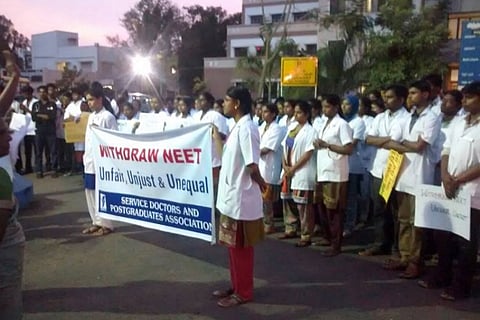

“Becoming a doctor was my childhood dream but it has been shattered because of NEET. Forget doctors, we don’t even have toilets in our village. I want to serve my village, but I can’t. People from CBSE background will not understand the toil and struggle of people like me.”
These are the words of Jerline, a medical aspirant from the Thenkasi taluk of Tamil Nadu, who has completed her high school education from a Tamil state board school. And she is not the only person who feels like that.
Many medical aspirants who have pursued their studies in languages other than English or Hindi find themselves in a similar situation: they might not be able to get a medical seat because of their language of education.
The Supreme Court verdict on the National Entrance-cum-Eligibilty Test, allowing for a common entrance exam for medical and dental seats across the country, came as a shocker for all aspiring doctors.
However, for medical aspirants like Jerline, it is much more than a shocker. The SC decision on NEET has the potential to set their lives back by a year. The Tamil Nadu government, in various instances, has opposed the move to enforce NEET.
Under the Tamil Nadu Regulation of Admission in Professional Courses Act, 2006, admissions to medical colleges under Tamil Nadu medical universities will be based on the final examination marks secured by the student in Class 12. NEET, not only overshadows the state government’s act, but it undermines the state’s power to tailor medical admissions to meet the state’s needs.
To begin with, NEET discriminates against Tamil-medium students who are coming from the state board schools in Tamil Nadu. These students have grown up studying in a Tamil medium school and the NEET exam will have questions only in English and Hindi. With the second stage of NEET exam scheduled to be held on July 24, it will be too short a time for the students to learn either of the languages.
“Under the 8th schedule of the Indian Constitution, there are 22 official languages. So if you are conducting a common entrance exam, you must be prepared to conduct it in all 22 languages. Otherwise, how can you conduct such exams?” asks Prince Gajendra Babu, an educational activist.
However, even if the question papers are made available in regional languages, the problem with NEET still persists, as the entrance exam follows the CBSE syllabus.
Samuel Asir Raj, Professor at the Manonmaniam Sundaranar University, explains all that is wrong with NEET following the CBSE syllabus. “There is 70% variation between the CBSE and state syllabus. For example, both curriculums cover bio technology. However, CBSE will have 20 pages of one chapter and state will have 10 pages of it. Likewise, in other subjects like Physics, Chemistry etc.,” he says.
“Further, 30 per cent of the CBSE syllabus is not covered by the state board, and 40 per cent of it will be advanced in CBSE, when compared to the state board. That makes a total of 70 per cent variation,” he adds.
Now, even if students want to learn the CBSE syllabus, they might not be able to do that because of the lack of availability of CBSE text books in Tamil. The CBSE books are available only in English and Hindi and this might be another major obstacle in the way of clearing the NEET exam.
Talking about the undue pressure faced by students, Prince says, “NEET is not a purely legal or academic issue. It is a very complex issue. Apart from all the academic difficulties, this will create a sort of inferiority complex in the minds of state board students. They will consider themselves as inferior to the CBSE students and all this affects the children’s psychologically.”
Adding to the woes, NEET also has negative marking. This might add up as another disadvantage for the students who are appearing for the common entrance exam. “Students from state board will only get negative marks if the entrance exam is conducted in this manner,” says Samuel.
So, what could be the way out for students who are forced to appear for NEET this time?
According to Prince, he says the state government should have the political will to stand by the interest of students. “As per the Constitution, since education is a concurrent subject, central government cannot interfere in the admission process of the state government owned colleges. So the state government can bring out a new legislation or ordinance, which will not abide by the new rule.”
Samuel, on the other hand, suggests a long-term strategy shift. Listing out the things that the government should do to tackle the issue, he says, “The government will have to change its syllabus immediately. The new syllabus should be at par with the CBSE one. Also, CBSE books should be translated to Tamil and the students should have access to these books, especially students in the rural areas. They should be given good coaching and teaching.”
All this, however, is not exclusive to Tamil Nadu. States like Andhra Pradesh, Telengana had also opposed the idea of NEET on similar grounds as Tamil Nadu.
“I wanted to study in Stanley Medical College in Chennai, but I am not sure I can. Is it too much for people like me to have a dream of this sort?” asks a disappointed Jerline.
Image courtesy: Facebook/Senthilkumar R